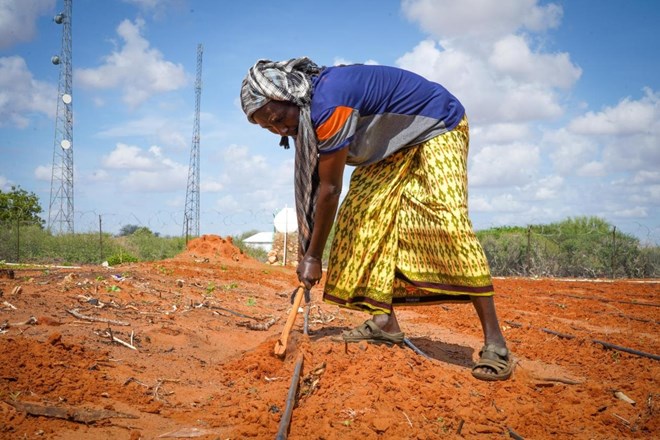
Friday December 6, 2024
FILE - Mahad Hirsi, a Somali farmer CREDIT: Spotlight Communications / IOM 2024
Mogadishu (HOL) — Somalia is grappling with the devastating impact of climate change, which has inflicted $2.84 billion in agricultural and livestock losses over two decades. A new report by SPARC (Supporting Pastoralism and Agriculture in Recurrent and Protracted Crises) reveals that worsening droughts and floods, fueled by global warming, have eroded livelihoods and strained the country’s fragile economy.
Between 2000 and 2021, climate-linked disasters accounted for 4.5% of Somalia’s agricultural GDP annually. The country’s farmers and pastoralists, who form the backbone of its economy, have borne the brunt of these losses, as failed harvests and dying livestock push families deeper into poverty.
“Somalia’s contribution to global emissions is negligible, yet it faces catastrophic impacts,” the report states. It calls on the international community to provide equitable financial support to help Somalia adapt to these challenges.
The cost of climate change extends beyond the economy. Millions of Somalis have been displaced by uninhabitable land, rising waters, and resource conflicts. Displacement camps, particularly those near Mogadishu, are overflowing with families struggling to survive. Children in these camps face malnutrition and diseases like cholera, worsened by overcrowded and unsanitary conditions.
“The rains destroyed everything,” said Abdi Hussein, a farmer from southern Somalia. “We lost our crops, our livestock, and now our home.”
The cascading effects of climate shocks also threaten Somalia’s health and social stability. Disrupted access to water and food, combined with an already fragile infrastructure, has increased the spread of preventable diseases, placing additional pressure on humanitarian systems.
The Federal Government of Somalia faces major fiscal constraints, with its budget constituting only 4% of the country’s GDP. More than half of this budget relies on international aid, leaving little room to address the worsening impacts of climate change. On average, climate-related losses consume 86% of the government’s annual revenue.
The report emphasizes that Somalia cannot tackle this crisis alone. It urges wealthy nations to fulfill their climate finance commitments, particularly through the Loss and Damage Fund established at COP27.
SPARC’s report provides a roadmap for addressing Somalia’s climate challenges:
- Expand Climate Financing: Increased contributions to the Loss and Damage Fund are critical to addressing the scale of the crisis.
- Enhance Risk Management: Instruments like disaster contingency funds and insurance mechanisms can mitigate immediate impacts.
- Strengthen Data Collection: Improved reporting on climate-induced losses will enable Somalia to better advocate for international support and plan for future resilience.
Somalia’s climate struggles mirror its neighbours in the Horn of Africa, including Ethiopia and Kenya. Erratic weather patterns have exacerbated resource competition, displacement, and regional instability. The report concludes with a call to prioritize the world’s most vulnerable nations in the fight against climate change, warning that inaction will leave millions at risk and further destabilize the region.